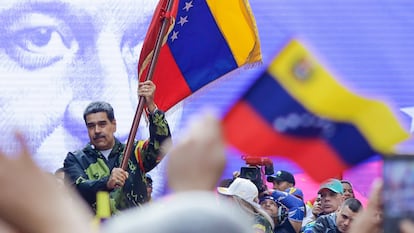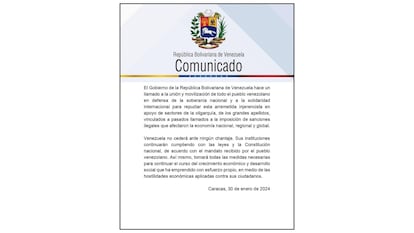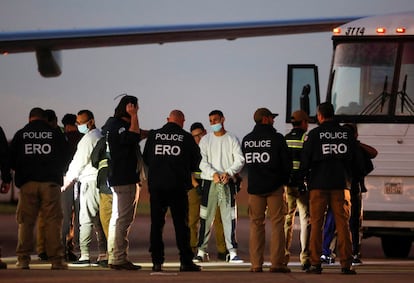US announces plans to reimpose oil sanctions on Venezuela
Caracas views Washington’s decision as an attack on its sovereignty and maintains its veto on opposition candidate María Corina Machado


The United States has announced that it will not be renewing the oil and gas licenses it had granted to Venezuela in exchange for a democratic opening of the country. Washington had given Nicolás Maduro until April to retract its veto on María Corina Machado, the main opposition candidate to run in the presidential elections, but the firm stance taken by President Maduro and his close associates regarding the ban has prompted the State Department to announce on Tuesday that the truce between the two countries has effectively expired. The door that White House spokesman John Kirby had opened to further negotiations by delaying a final decision until April has now been shut and the situation is deadlocked once again.
On April 18, the authorizations issued to oil companies to negotiate with Venezuela will expire and the expectations generated in the sector that they might be extended — in view of the contractions experienced by the global energy market amidst two ongoing wars — have bottomed out after the response given by Washington. Venezuela has replied immediately to denounce what it believes to be blackmail. The country responds in the same compromising terms in which the negotiation of an electoral solution to the ongoing political crisis in the South American country has been proposed.
Vice President Delcy Rodríguez warned that the migrant repatriation flights provided from the U.S. to Caracas will be suspended, in order to alleviate domestic pressure on Joe Biden’s administration due to the large-scale arrival of Venezuelan citizens and other nationalities at its borders seeking a better life. “If they make the mistake of intensifying economic aggression against Venezuela, at the request of the extremist lackeys in the country, as of February 13, repatriation flights for Venezuelan migrants will be immediately revoked, and any existing cooperation mechanism will be reviewed as a countermeasure to the deliberate attempt to attack the Venezuelan oil and gas industry,” responded the official in a message to the State Department spokesman, Matthew Miller. The February 13 deadline was set because on this day, according to an update from the U.S. Treasury, the first licenses regarding transactions with Venezuelan gold will expire.

For the U.S., the “actions by Nicolás Maduro and his representatives, including the arrest of members of the democratic opposition and the barring of candidates from competing in this year’s presidential election,” are inconsistent with the agreements signed in Barbados in October. The document clarifies that general license 44, which has provided relief to the Venezuelan oil and gas sector since last November, in the absence of “progress between Maduro and his representatives and the opposition Unitary Platform” will not be renewed when it expires in two and a half months.
Washington is calling for a return to the Barbados agreements, which the pro-Chavez government insists it is complying with and the opposition denounces have been completely violated. “We will continue to work with the international community and all peaceful democratic stakeholders across the political spectrum in Venezuela and we will use the mechanisms at our disposal to encourage a return to the principles of the Barbados agreement,” stresses Washington.
Venezuela has decided to press ahead towards a bespoke election, leaving aside the main candidate chosen in the primaries, who is the clear frontrunner in the polls. It is now encouraging candidacies from other minority sectors — sometimes allied to Chavismo — which, given the precarious support they hold, could be defeated. The president of the National Assembly of Venezuela, Jorge Rodríguez, said that next week the date for the elections will be set and the schedule will be defined. The Maduro administration will not reverse the disqualification of Machado, believed to be fixed by specialists and for which she was not able to defend herself in a trial.

The Venezuelan conflict is like a dog chasing its own tail. Once again, after a process that involved several moves on the chessboard, the situation is now approaching the deadlock it was in before. There is a risk that the direct dialogue that Washington and Caracas had established, after the secret talks in Doha, will collapse yet again. “The Bolivarian Republic of Venezuela condemns the most recent attempts of blackmail and interference in its internal affairs by the government of the United States of America, which constitutes an ultimatum against the entire Venezuelan society and, through coercion and threats, seeks to enforce a coup, disregard the institutions of the Republic, apply new coercive measures, and destabilize the Venezuelan economy and the well-being of its people,” said Venezuelan foreign minister, Yvan Gil.
After partial objectives were achieved, including the extradition of Alex Saab and the temporary easing of sanctions, the Maduro government has granted scant concessions to the opposition and has once again entrenched itself. Since the sectoral sanctions were imposed in 2019, the Venezuelan government has learned to navigate in the midst of the siege enforced by the U.S. Indeed, it was Saab who became the government’s financial operator in such circumstances until he was arrested in Cape Verde in 2020 and subsequently extradited to the U.S.
The president of Petróleos de Venezuela (PDVSA), Pedro Tellechea, called a press conference this Tuesday to announce that the oil industry is prepared for any eventuality, in view of the limitations that the reimposition of the sanctions will involve. Tellechea said that the measures adopted by the United States will also have consequences in the North American country, as he confirmed that its crude oil inventories are low. The oil industry has been striving to improve production — which has dropped to its lowest levels due to years of lack of investment, mismanagement and rampant corruption — having been exacerbated since the imposition of the sanctions. From producing 3.2 million barrels per day, Venezuela reached 400 thousand barrels in 2020, its worst year. This volume has increased to some 800 thousand barrels per day thanks to the flexibility of the operations of the joint ventures that the state has established with Chevron, Eni and Repsol, without substantial impacts on the economic situation of the country, which has managed to curb inflation at a cost that is too high as a result of the decline in consumption.
Sign up for our weekly newsletter to get more English-language news coverage from EL PAÍS USA Edition
Tu suscripción se está usando en otro dispositivo
¿Quieres añadir otro usuario a tu suscripción?
Si continúas leyendo en este dispositivo, no se podrá leer en el otro.
FlechaTu suscripción se está usando en otro dispositivo y solo puedes acceder a EL PAÍS desde un dispositivo a la vez.
Si quieres compartir tu cuenta, cambia tu suscripción a la modalidad Premium, así podrás añadir otro usuario. Cada uno accederá con su propia cuenta de email, lo que os permitirá personalizar vuestra experiencia en EL PAÍS.
¿Tienes una suscripción de empresa? Accede aquí para contratar más cuentas.
En el caso de no saber quién está usando tu cuenta, te recomendamos cambiar tu contraseña aquí.
Si decides continuar compartiendo tu cuenta, este mensaje se mostrará en tu dispositivo y en el de la otra persona que está usando tu cuenta de forma indefinida, afectando a tu experiencia de lectura. Puedes consultar aquí los términos y condiciones de la suscripción digital.








































